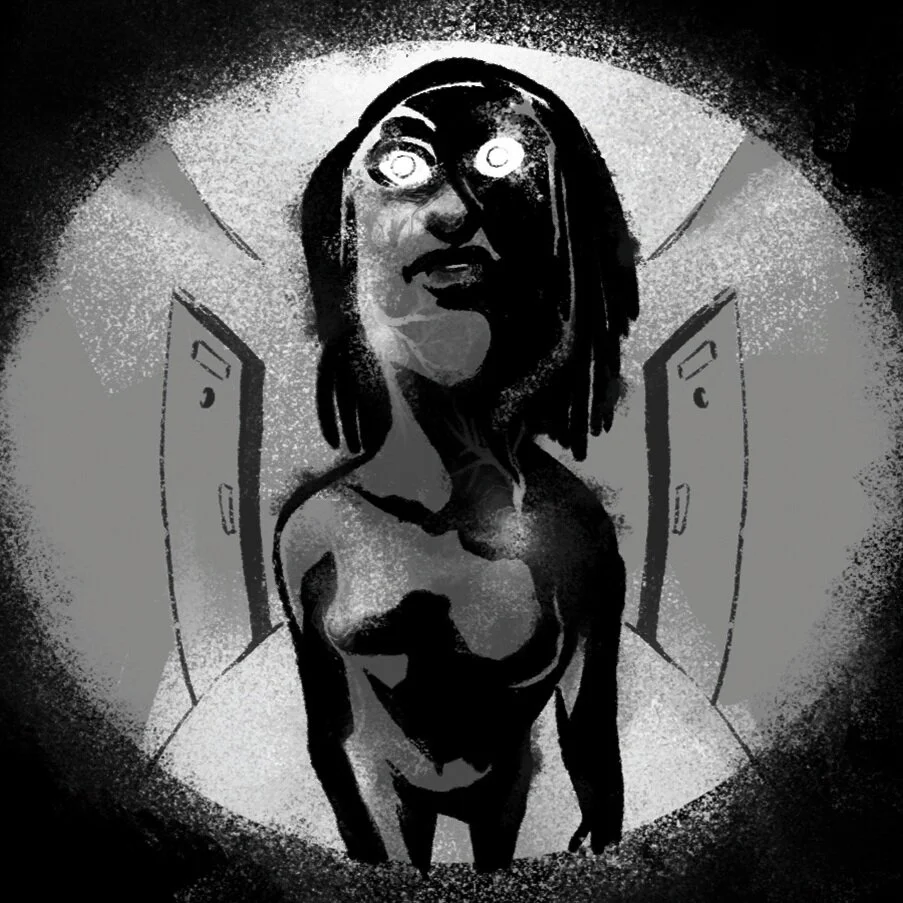Issue #11 | Excerpt, "An Eventual Feast"
AS SEEN IN PLANET SCUMM ISSUE #11
WRITTEN BY LINDSAY KING-MILLER
Illustration by Maura McGonagle
Zophie and I walked through the front room (which the Ark’s schematics anachronistically labeled a “parlor”) and into the bedroom, where Ave was sitting up in bed, typing. They were a theoretical botanist, part of the team that oversaw the gardens, greenhouses, and air filtration systems. One of their long-term projects, discussed and then back-burnered every month like clockwork, was to “investigate anomalies in the human remains composting process”—that is, figure out why we had zombies. Although Ave was ostensibly on pregnancy leave since the beginning of the third trimester, they still worked as much as they ever had, albeit with a longer midday break for naps.
“Hey, Zoph. Hey, Magda,” they said without looking up. “Is it nine already?”
I bent over and kissed the top of their head, where their hair swirled in a perfect cowlick. “Just about,” I said.
Actually, Zophie was a few minutes early. Maybe she’d been awake before her alarm this morning, listening for Aisha in the dark.
Of course, the dead don’t breathe, but if it’s quiet enough you can hear a sort of low hum in their vicinity. It’s not a human sound; it doesn’t come from their vocal cords, but from the green stuff, the algae and microorganisms. That genetically engineered soup that was supposed to digest dead bodies into clean soil and water but instead made them get up and walk.
Ave tapped a sequence of buttons on their computer, and it shut down and retracted into the wall. I stood awkwardly in the doorway while Zophie checked Ave’s blood pressure and the fetus’s position. I always felt ancillary during these prenatal visits, unsure what I could contribute as the non-gestational mother. Now, the knowledge that Aisha waited outside our door made me even more fidgety and distracted than usual.
With Zophie’s help, Ave got to their feet and slipped into the bathroom to provide a urine sample. Normally, in their absence, Zophie would turn to me and ask how I was doing, perhaps suggest a new breathing exercise or herbal tincture for my anxiety.
“I’m not just Ave’s midwife, I’m your family’s midwife,” she’d reminded me more than once. “It’s my job to take care of all
of you.”
Sometimes we’d talk about how I could help during the birth; sometimes I’d just take the space to acknowledge, outside of Ave’s hearing, the terror that always shimmered at the corners of my vision. There had never yet been a baby born in space. Two years into this voyage, we were over the edge of the map, where nameless monsters roamed. Nobody really knew how this would go.
Usually Zophie calmed my nerves. She’d remind me that she was extensively trained, had attended hundreds of births back on Earth, and besides, we had a team of surgeons and every conceivable medical technology at our disposal. The Ark was short on luxuries and living space, but no expense had been spared on the possibility of producing future generations of humanity.
But today she had no words of reassurance to offer me. We stood in the tiny room avoiding each other’s eyes.
“Maybe it’s nothing,” I said finally, just to be saying something.
“It’s not nothing,” she said. I couldn’t respond to that, because I knew she was right.
Somehow, the dead could predict death. The green stuff they were made of was designed to quickly digest human remains into materials that could be fed back into our greenhouses and food supply, but instead of waiting for bodies to come to them in the composting facility, they climbed out of their slime vats and went foraging. When they began to follow a living Ark passenger around, it was a sign that person would die soon—within days, a week at most.
The dead didn’t interfere; they just waited.
They waited for Lidden Hersch to collapse of a brain aneurysm. They waited for Vikram Sethi to bleed out following an accident with an industrial laser. They waited for Aisha Greer until, sick of wondering what fate they predicted for her, she cut her own throat in a shower stall. That one clawed at me. Was it suicide, really, if she already knew she was going to die? Or had the dead killed her themselves, with the omen of their presence?
Everyone had heard the stories, but my spot on the shower rota was right after Aisha’s. I found her before they were through with her. It didn’t look like anything I’d ever seen in a movie back home.
The dead—the stuff they were made of—abandoned their human shapes and poured over Aisha like a wave. More accurately, perhaps, like a chemical spill, eating away at her flesh as I watched, then at the bones beneath. I had the anatomy lesson of a lifetime, standing there in my robe with a dissolvable soap pellet in my hand, watching them strip away every layer of Aisha one by one.
When she was broken down all the way, when nothing remained except that primordial ooze that digested and replenished itself, the dead stood back up, and Aisha stood with them.



